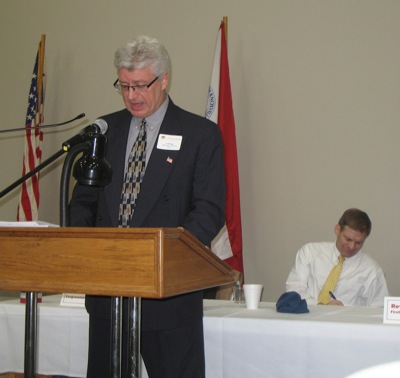Friday, February 1st, 2013
School officials cautiously optimistic of plan
Kasich said his education overhaul would level playing field for districts
By Amy Kronenberger
Local superintendents are cautiously optimistic about Gov. John Kasich's school funding plan overhaul that he said levels the playing field for all schools.
Officials in the Grand Lake area heard Kasich introduce his new funding plan he calls "Achievement Everywhere" during a meeting Thursday in Columbus held for all state school superintendents. He later discussed the plan during an online town hall meeting.
Area officials said they won't get their hopes too high until they know how the changes will specifically affect their districts. They expect to receive a breakdown of the numbers next week.
"My overall impression is that the new funding plan will help Parkway," said superintendent Greg Puthoff. "Once we receive the funding simulations, we will know if it will help or hurt."
Coldwater superintendent Rich Seas said he thought the governor showed he cared more about education and less about the money.
"Just being able to have a conversation with the governor to help funding is important because we need to get things done and him drawing attention to it is a good thing," he said. "I walked away yesterday seeing a general concern for education and I was happy about that."
Kasich's proposal gives funding priority to the financially disadvantaged districts. His goal is to bring every district in the state to the 96th percentile of overall valuation.
In districts with a low valuation, 20 mills ($20 for every $1,000 of assessed property value) in tax dollars may only produce $700 per pupil, he said. However in wealthier districts, 20 mills might produce $14,000 per pupil.
"That's clearly a chasm that we needed to close, and that's precisely what we've done," Kasich said. "If you live in a district that is property poor, then you're going to receive a lot more state aid. We're going to help you more. If you live in a district that has greater wealth, then we're going to expect you to help yourself."
Kasich plans to use individuals' wealth as an indicator for the next 15 mills of funding. For areas, especially agricultural areas, that are "land rich, cash poor," Kasich hopes to provide additional funding.
"So we've taken into account income as well as property value for the next 15 mills," he said. "So for the first 35 mills we're going to see a significant equalization, and we're going to see districts and children all across this state affectively compete with other children in other parts of the state."
After establishing his core funding, Kasich focused on add-ons. The state would analyze the percentage of poor, disabled, gifted and non-English speaking in each district and provide additional funds according to that district's needs.
Kasich said he intends to give more financial power to the principals to ensure the special needs funding goes to the right students.
The governor also would increase funding to kindergarten and pre-kindergarten programs to make sure every child gets off to the right start.
St. Marys superintendent Shawn Brown, Celina superintendent Jesse Steiner and Puthoff all said they were happiest about the increased funding to kindergarten. Because kindergarten traditionally operated as half days, the state only gave half the funding. However, most schools now have kindergarten all day, every day.
Kasich guaranteed no district would receive less funding than it did the previous year. Overall, funding would increase by $1.2 billion over the next two years, increasing from $6.9 billion to $7.4 billion in fiscal year 2014 and to $7.7 billion in 2015.
"The governor said no one will get less this year, which is a good thing," Steiner said. "Now we'll just have to wait and see how much more we get."
The proposal would be fully funded, Kasich said, because of the state's economic upturn. In the last two years, state officials saved money by streamlining Medicaid, cutting public jobs through attrition and creating new jobs. Ohio's deficit has been eliminated, its credit rating improved and it has become more job friendly, Kasich said.
"This is one thing we've always wanted to tell people," he said. "The more job friendly you are and the better the job situation we have here, the more revenue we have to be able to share with the priorities that we have. That's why this plan is fully funded and you see a significant increase in K-12 education."
To help further balance funds, Kasich proposed eliminating the funding guarantee to districts. The current model guarantees a district a certain amount of funding, regardless of how much it shrinks.
Some districts have seen their population drop in half while continuing to get an increase in funding, Kasich said. At the same time, growing districts are not receiving the additional funding they need.
"This is not sustainable and this is not fair," he said. "In this year's budget there's about a $400 million deal, but over the last couple decades your looking at billions of dollars getting poured into guarantees that distorts the formula and really prevents us from delivering the resources in the proper way."
Kasich continues the guarantee in his new proposal but told district officials to prepare for a phase out. The guarantee phaseout would negatively impact every district in the Grand Lake area except Fort Recovery. Every district's enrollment has dropped during the last 15 years except for Fort Recovery's, which has increased by 5.8 percent.
Although Seas does not like the idea of losing funding in the future, he understands the reasoning.
"I've never really liked it (the guarantee program)," he said. "It can be somewhat unfair and creates a sense of unfairness."
Along with the general funding, Kasich would like to provide the tools to create the optimal learning environment. He wants to focus on putting money directly into the classroom, where it can be best utilized, create special funds to help unsuccessful schools transition to successful ones and work with teachers to determine and eliminate any rules and regulations that create barriers that hold them back from teaching effectively.
Kasich also proposed creating a "Strait-A Fund" which sets aside $300 million dollars to provide one-time grants to move outdated districts into the 21st century. Districts could use the grant to upgrade technology and other needs to improve achievement levels and increase operational efficiency.
The fund also expands vouchers for parents to move children from low-performing schools to private ones.
Kasich's plan will be reviewed by members of the House and Senate.
Education overhaul details:
(AP) - Gov. John Kasich unveiled his plan for overhauling education funding on Thursday. Some specifics of the plan include the following:
• $1.2 billion in total new funds over the biennium for primary and secondary education.
• Funding formula assuring every school district that levies property taxes of $20 for every $1,000 of assessed value will generate same as a district with $250,000 per-pupil property tax base.
• Targeted assistance providing additional funds to districts based partly on income of residents.
• Additional funds to schools to help educate and support students with disabilities.
• Special funds for the first three years a student attends school in the United States to help students not yet proficient in English.
• Additional funds for school districts with large populations of disadvantaged students but limited access to early childhood programs.
• Special funds to allow extra steps by schools to help children living in poverty achieve.
• Option for schools to set aside certain mandates as long as health and safety issues are prioritized.




